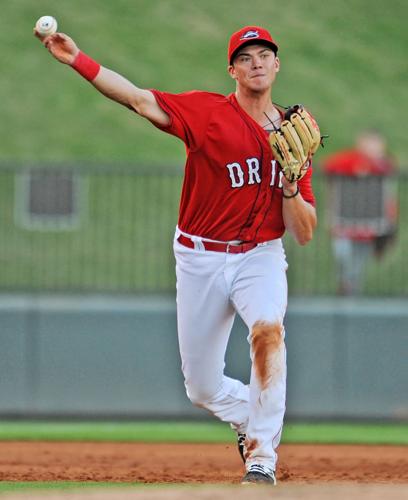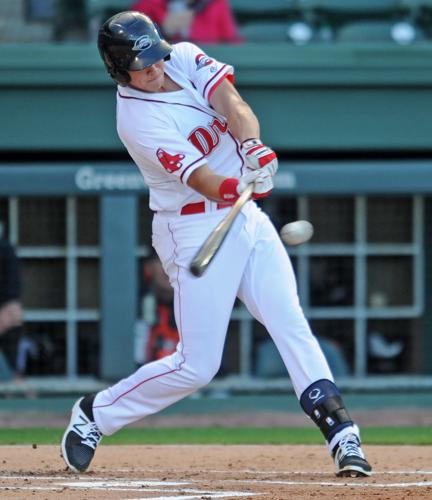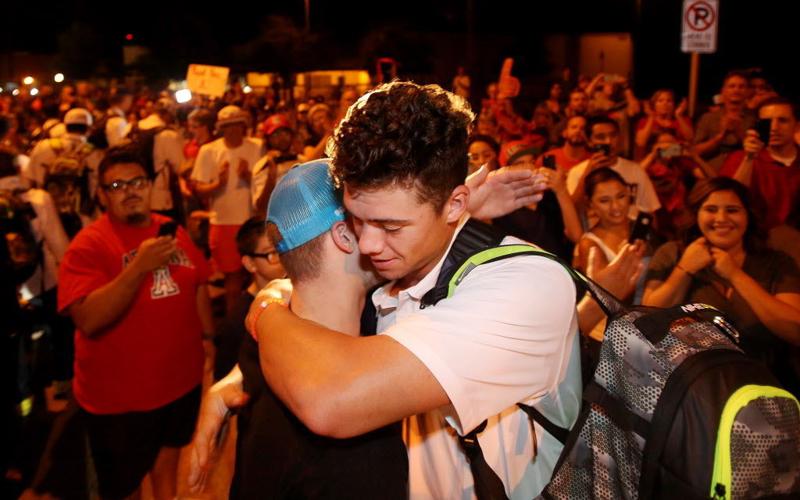At this weekend’s NFL draft in Philadelphia, lives are being changed. For highly drafted college football players, the change happens in an instant.
Bobby Dalbec spent Thursday on a rickety bus traveling from Greenville, South Carolina, to Augusta, Georgia, wondering just when he’ll hit the big time.
The life of a top baseball prospect is so unlike that of football and basketball rookies. Draft day is tantamount to a mirage. For a minute, maybe an hour — OK, give ’em a day — it is pure elation.
Dalbec did indeed receive a $650,000 signing bonus from the Boston Red Sox, who took the Arizona Wildcats star in the fourth round of last year’s draft. That’s not chump change.
And you’d be surprised how far half-a-mil will go in Greenville, South Carolina.
It will go very far.
Almost as far as the long road that currently sits in front of Dalbec.
Focus on the field
Dalbec knew what was coming.
Arizona coach Jay Johnson “would always say Arizona baseball is the closest you’ll get to being treated like a big-leaguer in a while, because once you get to the minors, it’s bad,” Dalbec said. “But it’s not as bad. It’s not fun, travel days are bad — my first year in Lowell (Massachusetts), we had a 14-hour bus ride. We had a bus break down two hours before the hotel.”
A half-year after breaking into professional baseball in a big way, when he hit .386 with 22 extra-base hits in 34 games with the short-season Lowell Spinners, Dalbec is back on the grind.
Dalbec entered Friday night’s game hitting .270 with one home run and nine RBIs for the Single-A Greenville Drive. He has already experienced a little bit of everything.
Dalbec yawns into the phone.
“We had an 18-inning game last night, so sorry if I’m a little spacey,” he says, “One of our position players threw three innings.”
Surprisingly, it wasn’t Dalbec, who threw 5º innings in the College World Series championship game loss to Coastal Carolina. He allowed zero earned runs and struck out eight.
Dalbec’s priorities have changed in pro ball. Blessed with a power swing that would make a Silver Slugger swoon and a growing aptitude for infield defense, Dalbec no longer toes the rubber. In an 18-inning game in Tucson, he may have been beckoned to pitch for five, maybe six of them, but in Greenville, the focus is solely on the future.
And that future is at third base, and, probably, in the middle of the lineup.
“It’s nice to focus on just being a position player,” he said. “I’ve made huge strides in my defense; my baseball IQ has gone up. The hitting has really taken off, being able to grind out at-bats better. I kind of found my swing more.”
It’s that swing that has scouts drooling, and the Red Sox coaches and managers wondering how much seasoning he’ll need. It sure impresses his teammates.
“Everyone knows what he can do at the plate, and he hits it further than anyone I’ve ever seen, and he has a great approach at the plate,” said Greenville teammate Nick Lovullo, who played against Dalbec in the Cape Cod League and remembers watching him in the CWS last year.
“I do think his defense is underrated, and the thing about Bobby that impresses me the most is he’s never satisfied with where he’s at. He’s doing really well right now, but day in, day out, he’s in the cages for early work, working on his defense, doing whatever he can.
“The goal isn’t to have success in Greenville,” Lovullo continued. “The goal is to have success in the major leagues. We all know we have a long way to go.”
“Nobody is great for five months straight”
College baseball is hard work, but with so many other aspects of the college life going on — class, much more practice, a social life — it almost feels like a series of part-time jobs.
Professional baseball? That’s full-time. More, really.
“On a normal day, I get to the field about 12:30 or 1 for a 7 p.m. start,” Dalbec said. “Early hitting, early defense, batting practice, fundamentals, then you play the game and do it all over again the next day. Then after a four-game series you get on a bus for six hours.”
For a player like Dalbec, who entered professional baseball with several question marks about his game, those five hours before the games are invaluable. That’s when you turn question marks into exclamation points.
“Our time as coaches is really from 2 to 7,” said Greenville Drive manager Darren Fenster, who played five seasons of minor-league ball before a knee injury ended his playing career in 2005. “That’s when we get our hands on them, get them to focus on some very small details of their individual games. Bobby, on the defensive side, it’s something as small as slowing him down so he doesn’t try to rush, getting his glove angle correct. That’s what we can break down in a very simplistic way.”
And so Dalbec goes to work. There’s no lunch pail in hand — this isn’t the 1950s, and the players often try to head to a mall food court for meals on the road — but at least in the batter’s box, there is a hard hat.
Much of Dalbec’s focus is on the defensive side, where he is trying to erase some of the impressions formed by as few as one viewing last season.
“Most of the people who wrote that stuff only saw me play one time; I’m not dogging them, but if they’re going to base my whole abilities off seeing me one time, they can go for it,” he said. “I know the abilities I have, and I know I’m only going to get better. All I can control is what I think of myself.”
This is music to Fenster’s ears.
In his sixth season in the Red Sox organization after a seven-year run with Rutgers, his alma mater, Fenster has seen all kinds.
“We get every single type of personality when guys come into pro ball, from the kid who was a star in high school or college and thinks he’ll automatically make it to the big leagues, to the guys who understand they’re here for a reason, and everyone in between,” Fenster said. “Bobby is as knowledgeable about his own ability as anyone I’ve seen at this level. That’s a strength in many cases, but it can hold you back, because he does hold himself to a high standard.”
When you’re chasing the major-league dream, don’t you have to?
He came into the 2017 season with his eyes wide open, ready to prove that his performance in Lowell last year was no fluke. He devoted the offseason to preparing himself for the physical tolls of a 140-game season, spending months in Tucson working out with the baseball team and trainers.
“You can’t not lift and then play 130 games or so,” he said.
More so, there is the mental grind that comes into play, usually around late May, when the rote behaviors of daily baseball start to have almost a numbing effect.
“I’m starting to figure out the little things mentally to get me through, but the biggest thing is, if it’s a tough day, you have to reframe your mind,” he said. “Instead of saying ‘I have to do this,’ you say, ‘I get to do this.’ ”
That tiny shift in perspective could be the difference between making it to The Show and a lifetime of regret.
“Once you get to your first full season, it’s about getting the routine down for 140 games,” Fenster said. “Staying on an even keel through ups and down, finding a way to play at the best of your ability when you’re dog-tired. When you get through your first full season, come the end of August, you have a good idea of what pro ball is truly about.”
Those ebbs and flows, they’d strangle a lesser man.
“Nobody is great for five months straight,” Fenster said. “The game is too hard. It’s about dealing with failure for a lot of guys, for the first time, and on the physical side, guys are in A-ball for a reason. If someone is ready for the big leagues, they’re going to be in the big leagues.”
Dalbec knows. He’s not ready for the big leagues.
Where your feet are
OK, then, so what’s it going to take?
“You have to do all the little things right, from what I’ve seen,” Dalbec said. “You have to have the talent, and the baseball IQ, but grinding out pitchers, making the easy plays, even making some of the hard plays. I don’t know too many guys who get fast-tracked. (Red Sox rookie) Andrew Benintendi, maybe, and he’s killing it. Some guys are like that, and some don’t blossom until two, three years in a row.”
Imagine that. Imagine being on the doorstep of destiny, and having to stand there for three years, just knocking. It would wear your knuckles down to the bone.
Luckily for Dalbec, he’s not alone in this chase for greatness.
He’s at home in Greenville, even if he had to find it himself.
“We had three days to find an apartment here,” he said. “My dad and my grandpa drove my truck from Denver.”
He’s settled in nicely, though, made some good friends on the team. Stephen Nogosek, the closer for the Drive, played for Oregon, and, Dalbec said, “I think I’ve known someone on every team we’ve played against this year.”
Just the day before, Greenville squared up against the Rome (Georgia) Braves, whose catcher, Brett Cumberland, was the 2016 Pac-12 Player of the Year at Cal.
“Baseball,” Dalbec said, “is a really small world.”
“Off the field, he’s a really quality human being,” said Lovullo, a Greenville second baseman and the son of Diamondbacks manager Torey Lovullo. “He’s a guy who everyone respects, likes in the clubhouse, and he’s helped create an atmosphere here. We’re going to have some fun and make life enjoyable; we’re around each other every day, and if you don’t enjoy walking into that clubhouse, it’s going to be a long season.”
Either way, it’s going to be a long season.
And, as Fenster says, you’re either on board or you get left behind.
“The whole romance of this, like Bull Durham? Look, if you don’t love baseball, minor-league baseball will chew you up,” Dalbec said.
“This is about being where your feet are, as I like to say, and that’s the best way to go about it.”






